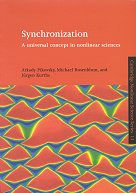First recognized in 1665 by Christiaan Huygens, synchronization phenomena are abundant in science, nature, engineering, and social life.
Systems as diverse as clocks, singing crickets, cardiac pacemakers, firing neurons, and applauding audiences exhibit a tendency to operate in synchrony.
These phenomena are universal and can be understood within a common framework based on modern nonlinear dynamics.
The first half of this book describes synchronization without formulae, and is based on qualitative intuitive ideas.
The main effects are illustrated with experimental examples and figures, and the historical development is also outlined.
The second half of the book presents the main effects of synchronization in a rigorous and systematic manner,
describing both classical results on synchronization of periodic oscillators,
and recent developments in chaotic systems, large ensembles, and oscillatory media.
This comprehensive book will be of interest to a broad audience,
from graduate students to specialist researchers in physics, applied mathematics, engineering, and natural sciences.

